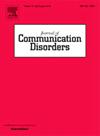Lexical organization in Spanish-speaking children with hearing loss
IF 2.1
3区 医学
Q2 AUDIOLOGY & SPEECH-LANGUAGE PATHOLOGY
引用次数: 0
Abstract
Introduction
Early language deprivation in children with hearing loss is an important cause of later language delays and hinders lexical organization. By studying how lexical organization affects lexical retrieval, it is possible to further understand lexical processing in children with hearing loss and their hearing peers.
Methods
The purpose of this study is to evaluate lexical organization among children with hearing loss. To this end, 43 children, divided into two groups, participated in two language production experiments. The deaf and hard-of-hearing (DHH) group consisted of 21 children with hearing loss who use either a cochlear implant or a hearing aid and oral language as their main means of communication; the typical hearing (TH) group consisted of 22 children with no hearing difficulties, paired by age to the DHH group. Experiment 1 consisted of a semantic verbal fluency task (SVF); lexical organization was evaluated through the grouping strategies used by participants within the semantic categories presented for the task. Experiment 2 consisted of a free word association task (FWA); lexical organization was evaluated through the types of lexical relations present between stimulus and response. To assess lexical retrieval we used, in Experiment 1 (SVF), the number of items produced in one minute, and in Experiment 2 (FWA), the response times.
Results
Lexical organization showed contrasting patterns in both tasks. Similarities between groups were found in grouping strategies in the SVF, but dissimilarities were unveiled in the FWA concerning the proportions in the types of lexical relations presented by both groups. Lexical retrieval evidenced group differences: children with hearing loss showed a less efficient retrieval strategy in the SVF and slower response times in the FWA than their typical hearing counterparts.
Conclusions
These results indicate that both groups show similar lexical organization in grouping strategies within a category. However, children with hearing loss have fewer word relations involving lexical abstraction compared to their hearing peers. Moreover, children with hearing loss use different strategies than their hearing peers to retrieve words from their mental lexicon. Suggestions for clinical applications in language therapy are provided.
听力损失西班牙语儿童的词汇组织
听力损失儿童早期语言缺失是导致后期语言迟缓和词汇组织障碍的重要原因。通过研究词汇组织对词汇检索的影响,可以进一步了解失聪儿童及其同龄人的词汇加工过程。方法本研究的目的是评估听力损失儿童的词汇组织。为此,43名儿童被分成两组,参与了两个语言生成实验。聋哑和听力障碍组(DHH)包括21名使用人工耳蜗或助听器并以口语作为主要交流手段的听力损失儿童;典型听力组(TH)由22名无听力障碍的儿童组成,按年龄与DHH组配对。实验1包括语义言语流畅性任务(SVF);词汇组织是通过参与者在任务中呈现的语义类别中使用的分组策略来评估的。实验2包括自由词联想任务(FWA);词汇组织是通过刺激和反应之间存在的词汇关系类型来评价的。为了评估词汇检索,我们在实验1 (SVF)中使用了一分钟内产生的条目数,在实验2 (FWA)中使用了响应时间。结果在两个任务中,词汇组织呈现出截然不同的模式。两组在分组策略上存在相似性,但在词汇关系类型中所占比例上存在差异。词汇检索证明了组间差异:听力损失儿童在SVF中的检索策略效率较低,在FWA中的反应时间较慢。结论两组学生在同一范畴内的分组策略中表现出相似的词汇组织。然而,与听力正常的同龄人相比,听力损失儿童涉及词汇抽象的单词关系较少。此外,听力损失儿童使用不同的策略从他们的心理词汇中检索单词。对语言治疗的临床应用提出了建议。
本文章由计算机程序翻译,如有差异,请以英文原文为准。
求助全文
约1分钟内获得全文
求助全文
来源期刊

Journal of Communication Disorders
AUDIOLOGY & SPEECH-LANGUAGE PATHOLOGY-REHABILITATION
CiteScore
3.30
自引率
5.90%
发文量
71
审稿时长
>12 weeks
期刊介绍:
The Journal of Communication Disorders publishes original articles on topics related to disorders of speech, language and hearing. Authors are encouraged to submit reports of experimental or descriptive investigations (research articles), review articles, tutorials or discussion papers, or letters to the editor ("short communications"). Please note that we do not accept case studies unless they conform to the principles of single-subject experimental design. Special issues are published periodically on timely and clinically relevant topics.
 求助内容:
求助内容: 应助结果提醒方式:
应助结果提醒方式:


